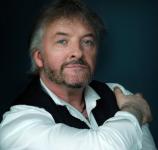The Book of Lost Things
Review
The Book of Lost Things
Just as World War II is rearing its ugly head in the skies above London, David's mother succumbs to the cancer that has wracked her body for months. Almost before David --- a quiet, sensitive, secretly angry boy who concocts a series of rituals intended to keep his beloved mother alive --- has grasped the reality of his mother's death, his father remarries. Soon David's father and despised stepmother have a new baby, Georgie, whose presence the 12-year-old David envies and resents.
Relocated to Rose's family's crumbling manor house outside London, David retreats to his bedroom, a book-lined room that once belonged to Rose's great-uncle who vanished mysteriously when he was David's age. David begins to hear the books talking to him, whispering their secrets and appearing in his dreams, where a mysterious figure called the Crooked Man haunts the edges of David's world, trying to find a way in.
One night, David clearly hears the voice of his mother calling to him from the Crooked Man's world, begging David to save her. Rushing out into the garden, David barely escapes the wreckage of a fallen German bomber --- and finds himself transported to the Crooked Man's world. There David befriends a Woodsman, who protects David as he learns more about this strange new place, and meets the Crooked Man himself, a wily trickster whose secrets reflect the darkest, ugliest reaches of the imagination.
The Woodsman accompanies David on a quest to find the king of the realm, an elderly man in search of an heir. David is beset at every turn by the Loups, a race of half-wolf, half-men (born out of the union of Red Riding Hood and the wolf) whose leader wants to claim the throne himself. When the Woodsman is killed, David is left to discover the hidden secrets of this bizarre new land --- and his own hidden strengths --- by himself.
Peopled by characters from fairy tales and myths, inspired by the rich imaginary worlds that are so real to children, John Connolly's imaginary land is a fantastic, cleverly realized place where childhood fears and fantasies come to life. More than anything, Connolly's novel is an ode to the power of story. "Stories...came alive in the telling... They were like seeds in the beak of a bird, waiting to fall to earth, or the notes of a song laid out on a sheet, yearning for an instrument to bring their music into being. They lay dormant, hoping for the chance to emerge. Once someone started to read them, they could begin to change. They could take root in the imagination, and transform the reader."
Connolly's work is grounded in familiar fairy tales, but it is by no means a novel for children (although mature teens would probably relish it). Indeed, for the Irish novelist, who is best known for his books about serial killers, THE BOOK OF LOST THINGS, with its grisly violence and sexual perversions, is not as much of a departure as it might seem at first. Connolly's latest effort, though, pushes his storytelling skills in new directions, resulting in a novel that combines old-fashioned storytelling with modern sensibilities, that includes a moral without being moralistic, much like the best classic fairy tales themselves.
Reviewed by Norah Piehl on October 16, 2007
The Book of Lost Things
- Publication Date: October 16, 2007
- Genres: Fiction
- Paperback: 480 pages
- Publisher: Washington Square Press
- ISBN-10: 074329890X
- ISBN-13: 9780743298902





